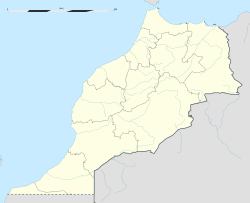The 1953 Oujda revolt (Arabic: انتفاضة 16 غشت 1953, French: La tuerie d'Oujda, lit. 'The Oujda massacre') was an anti-colonial revolt against the French protectorate, in the context of the Revolution of the King and the People, that took place in Oujda August 16, 1953.[1][2][3][4] It was followed by a second insurrection in Tafoughalt the next day.[1]
It came ten days after an "electoral tour" procession by Thami El Glaoui, who was campaigning to overthrow Sultan Muhammad V.[2]
Aftermath
editThe dead included European members of the "service d'ordre", Moroccans known to support Thami El Glaoui, and protesters.[2] 96 Moroccans were prosecuted for their involvement.[2]
References
edit- ^ a b "انتفاضة 16 غشت 1953 بوجدة .. محطة وضاءة في تاريخ المغرب المعاصر". Maroc.ma (in Arabic). 2021-08-15. Retrieved 2022-09-28.
- ^ a b c d "Quatre-vingt-seize Marocains poursuivis pour participation à la « tuerie d'Oujda », qui fit trente morts le 16 août 1953, passent en jugement". Le Monde.fr (in French). 1954-11-30. Retrieved 2022-09-28.
- ^ "L'histoire du complot: DOCUMENTAIRE". Esprit (1940-). 206 (9): 357–377. 1953. ISSN 0014-0759. JSTOR 24253433.
- ^ "وجدة: شهادات حية لمقاومي انتفاضة 16 غشت1953 في حفل تكريمهم من طرف الجماعة الحضرية بوجدة". مغرس. Retrieved 2022-09-28.
